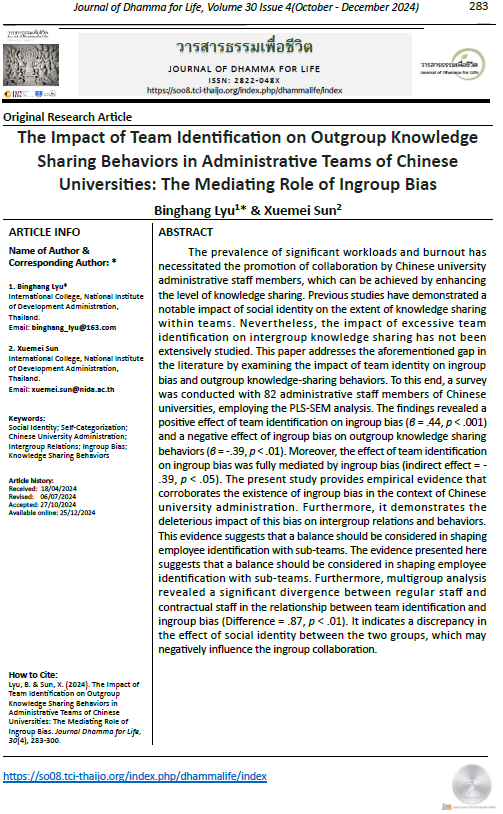The Impact of Team Identification on Outgroup Knowledge Sharing Behaviors in Administrative Teams of Chinese University: The mediating Role of Ingroup Bias
Main Article Content
Abstract
The prevalence of significant workloads and burnout has necessitated the promotion of collaboration by Chinese university administrative staff members, which can be achieved by enhancing the level of knowledge sharing. Previous studies have demonstrated a notable impact of social identity on the extent of knowledge sharing within teams. Nevertheless, the impact of excessive team identification on intergroup knowledge sharing has not been extensively studied. This paper addresses the aforementioned gap in the literature by examining the impact of team identity on ingroup bias and outgroup knowledge-sharing behaviors. To this end, a survey was conducted with 82 administrative staff members of Chinese universities, employing the PLS-SEM analysis. The findings revealed a positive effect of team identification on ingroup bias (β = .44, p < .001) and a negative effect of ingroup bias on outgroup knowledge sharing behaviors (β = -.39, p < .01). Moreover, the effect of team identification on ingroup bias was fully mediated by ingroup bias (indirect effect = -.39, p < .05). The present study provides empirical evidence that corroborates the existence of ingroup bias in the context of Chinese university administration. Furthermore, it demonstrates the deleterious impact of this bias on intergroup relations and behaviors. This evidence suggests that a balance should be considered in shaping employee identification with sub-teams. The evidence presented here suggests that a balance should be considered in shaping employee identification with sub-teams. Furthermore, multigroup analysis revealed a significant divergence between regular staff and contractual staff in the relationship between team identification and ingroup bias (Difference = .87, p < .01). It indicates a discrepancy in the effect of social identity between the two groups, which may negatively influence the ingroup collaboration.


